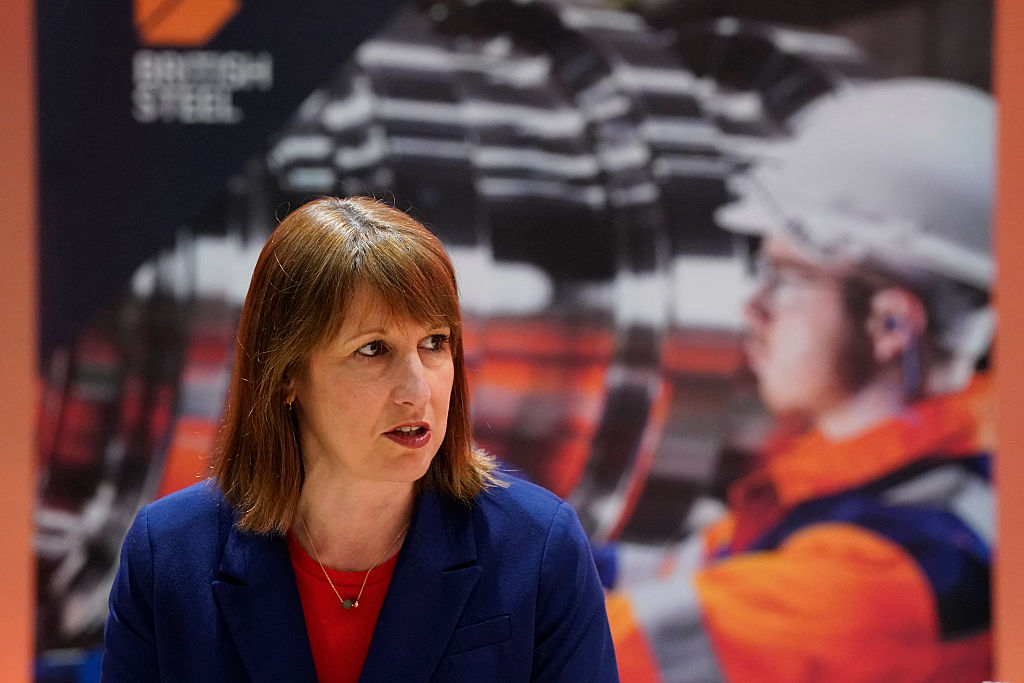Why did the government take over British Steel – and was it a good idea?

Try 6 issues free View all Investing Stocks and Shares Commodities Personal Finance Personal Finance Personal Finance Personal Finance View all Personal Finance Bank accounts Credit cards Latest Issue MoneyWeek Glossary Newsletter sign up Premium Bonds hotspots Mag 7 earnings Profit from private equity Reeves' pension funds plan MoneyWeek Readers' Choice Awards Why did the government take over British Steel – and was it a good idea? The government has stepped in to take control, but not ownership, of the floundering British Steel company, citing national security and other factors. Does the decision make sense? Newsletter sign up When you purchase through links on our site, we may earn an affiliate commission. Here’s how it works. (Image credit: DANNY LAWSON/POOL/AFP via Getty Images) Simon Wilson 28 April 2025 in Features Has British Steel been nationalised? Not quite. Earlier this month, the government passed an emergency law to take operational control of the company, but it doesn’t actually own it. That’s an uneasy, temporary solution to a chronic problem, and it’s not yet clear whether the state will find a willing buyer – or at least someone who’ll pay a nominal sum to take on the bulk of British Steel’s debt pile and operating losses – or whether full state ownership beckons. The government stepped in to save 3,500 jobs in Scunthorpe, and because the Chinese-owned British Steel plant there is the last remaining manufacturer of “virgin” steel in the UK (meaning steel made from scratch from raw materials, as opposed to steel made from recycled scrap). According to Jonathan Reynolds, the business secretary, “it’s never been more important” to build domestic resilience in supply chains, adding that it was “in the national interest to help secure UK steel-making for the future”. Eventual full nationalisation is the “likely option”, says Reynolds. What’s the current situation? The two sides – Chinese owner Jingye and the government – had been negotiating for months about a taxpayer-funded package to help British Steel invest in greener technology. Jingye rejected an offer of £500 million, insisting it needed £1 billion towards building two less carbon-intensive electric arc furnaces (that are used to make recycled steel, but not virgin). Earlier this month, there appears to have been a sudden and dramatic loss of confidence within Whitehall in Jingye’s good faith and willingness to keep the loss-making plant running in the face of Donald Trump’s 25% tariffs on steel. Once furnaces cool it’s prohibitively expensive to start them up again – meaning it was now or never for the government to act. Closing the two Scunthorpe furnaces would have left the UK as the only G7 economy without the ability to manufacture its own virgin steel. Does that matter? Almost the whole of parliament agreed that it does. Others are more sceptical. There are many strands to the pro-nationalisation drive, says Daniel Finkelstein in The Times, but the most important concerns national security and defence. It has been widely accepted that we must be able to make virgin steel for our defence sector. And steel would clearly be important in the event of a war. “But so would lots of things,” says Finkelstein. Microchips, rare-earth elements, propellants, batteries, imaging equipment, tracking systems – we import them all. It’s unclear why Britain’s tiny sliver of global steel production – it accounts for less than 0.3% of it – would help much, especially if cut off from supplies of iron ore and coking coal. In the House of Lords debate, Daniel Hannan put it like this: “to have security of supply, whether of steel or anything else, is to source from the widest possible variety of sources so that you are not subject to a localised shock or disruption, which might as easily happen in your own territory as anywhere else”. As such, the UK’s position is “extremely comfortable”, in that no foreign country accounts for more than 15% of imports – and the four biggest are our friendly neighbours Germany, Spain, the Netherlands and Belgium. “If, in some bizarre world, we were blockaded by the EU, we would still be able to import from Algeria, Turkey, Vietnam and South Korea before we got to China, which accounts for only 7%” of UK steel imports. Subscribe to MoneyWeek Subscribe to MoneyWeek today and get your first six magazine issues absolutely FREE Get 6 issues free Sign up to Money Morning Don't miss the latest investment and personal finances news, market analysis, plus money-saving tips with our free twice-daily newsletter Don't miss the latest investment and personal finances news, market analysis, plus money-saving tips with our free twice-daily newsletter How much is all this costing? Even without nationalisation, keeping British Steel’s operations running is going to cost the Treasury hundreds of millions, at least, since it’s a highly loss-making business. Jingye says that as of March, British Steel was losing more than £700,000 a day and that it was no longer “financially viable”. That figure is consistent with the most recent accounts, which show that British Steel made a pre-tax loss of £231 million in 2023 (and an even bigger loss in 2022, of £408 million on turnover of £1.7 billion). Moreover, it has a massive debt pile – £736 million at the end of 2023, and likely to be higher now, given the surge in the prices of raw materials and energy costs. The government is expecting to cover annual losses of around £230 million, but reckons the price is worth it, compared with the cost of the company’s complete collapse, which (according to Reynolds) would be “easily over £1 billion”. What happens next? That’s very unclear. The government may have felt forced to step in, but the current situation can only be a stopgap. The bottom line is that the furnaces are “old, unprofitable and very polluting, and will have to close if the UK is to meet its net-zero climate targets”, says the Financial Times. Ministers hope to find a private-sector buyer rather than nationalise the business, but that might be a vain hope. There may be viable private suitors, especially if the government chucks in a £500 million subsidy and promises action to help reduce energy costs. “But to get an investment deal over the line, ministers need to offer a genuinely sustainable and profitable business case for Britain’s steel industry. That may yet be the toughest thing to pull off.” Shouldn’t British Steel just be nationalised? No, says The Economist. The government takeover smacks of desperation and reveals they have no sensible plan. Reynolds argues that the steel industry can have an “enormous role” in driving Labour’s growth agenda. “Yet the notion that propping up an ailing sector will somehow boost Britain’s productivity is bizarre.” Yes, we need to build lots of houses, railways and wind turbines. But that can be done using cheaper metals from elsewhere, with no need for state ownership. Nationalising British Steel looks like defence spending or employment subsidy by another name. If so, there would be better ways to spend the money. This article was first published in MoneyWeek's magazine. Enjoy exclusive early access to news, opinion and analysis from our team of financial experts with a MoneyWeek subscription. Sign up for MoneyWeek's newsletters Get the latest financial news, insights and expert analysis from our award-winning MoneyWeek team, to help you understand what really matters when it comes to your finances. Contact me with news and offers from other Future brandsReceive email from us on behalf of our trusted partners or sponsorsBy submitting your information you agree to the Terms & Conditions and Privacy Policy and are aged 16 or over. Simon Wilson Social Links Navigation Simon Wilson’s first career was in book publishing, as an economics editor at Routledge, and as a publisher of non-fiction at Random House, specialising in popular business and management books. While there, he published Customers.com, a bestselling classic of the early days of e-commerce, and The Money or Your Life: Reuniting Work and Joy, an inspirational book that helped inspire its publisher towards a post-corporate, portfolio life. Since 2001, he has been a writer for MoneyWeek, a financial copywriter, and a long-time contributing editor at The Week. Simon also works as an actor and corporate trainer; current and past clients include investment banks, the Bank of England, the UK government, several Magic Circle law firms and all of the Big Four accountancy firms. He has a degree in languages (German and Spanish) and social and political sciences from the University of Cambridge. Should you invest in UK dividend stocks? UK dividends totalled £14 billion in the first quarter, falling 4.6% annually but still beating expectations. Which sectors were the top payers, and will Trump’s tariffs prompt cuts? ByKatie Williams Property wealth in hands of over 60s hits record level Over 60s property owners are estimated to be sitting on a record £2.89 trillion of net housing wealth, according to the latest data from property firm Savills, and they are showing little signs of wanting to downsize ByLaura Miller You might also like 'Rachel Reeves' plan to force pension funds into UK assets won't work' Hustling pension fund cash into British assets sounds like a good idea. It would be better to make Britain an attractive place to invest, says Matthew Lynn ByMatthew Lynn What caused the Birmingham bin strike – and what does it mean for British businesses? The Birmingham bin strike is the fallout from an equal-pay claim brought by female cleaners. That bodes ill for the rest of British business BySimon Wilson A new wealth tax is a terrible idea. The rich are already being hit by sneaky taxes – Merryn Somerset Webb Ideologues want to squeeze more tax out of the rich with a wealth tax. They’re already wrung dry, says Merryn Somerset Webb ByMerryn Somerset Webb Why are energy bills so expensive in the UK? Electricity bills in the UK are higher than in any comparable rich country. Some blame the net-zero zealotry of the government for that. What is really to blame for high energy bills? BySimon Wilson Five years on: what did Covid cost us? We’re still counting the costs of the global coronavirus pandemic – and governments’ responses. What did we learn? BySimon Wilson London can lure Brexit-fleeing banks back to UK – but the City must move quickly Many banks fled to Paris in the wake of Brexit but are now in full-scale retreat. The City should move quickly to lure them back, says Matthew Lynn ByMatthew Lynn Spring Statement: Rachel Reeves 'must turn good intentions into effective measures' Chancellor Rachel Reeves understands the economy’s structural problems but is unlikely to solve them, says Max King ByMax King England's department stores return – but do they have a future? The great traditional retail shops of Middle England have bounced back for now. Don’t get too carried away though, says Matthew Lynn ByMatthew Lynn View More \25b8 Useful links Subscribe to MoneyWeek Get the MoneyWeek newsletter Latest Issue Financial glossary MoneyWeek Wealth Summit Money Masterclass Most Popular Best savings accounts Where will house prices go? Contact Future's experts Terms and Conditions Privacy Policy Cookie Policy Advertise with us Moneyweek is part of Future plc, an international media group and leading digital publisher. Visit our corporate site. Future Publishing Limited Quay House, The Ambury, BA1 1UA. All rights reserved. England and Wales company registration number 2008885.
















